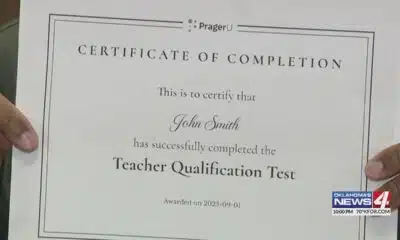News from the South - Kentucky News Feed
Relief from drug industry middlemen stalled in Kentucky as independent pharmacies struggle
by Deborah Yetter, Kentucky Lantern
July 3, 2025
Kentucky’s independent pharmacies, facing ongoing financial pressure, had hoped for relief from a new law meant to give them more clout against prescription drug industry middlemen known as pharmacy benefit managers, or PBMs.
“Most pharmacies were just hanging on for Senate Bill 188,” said independent pharmacist Rosemary Smith, referring to the 2024 legislation sponsored by Sen. Max Wise, R-Campbellsville, meant to strengthen state regulation of PBMs.
The new law — passed with overwhelming support by the legislature and signed into law by Gov. Andy Beshear last year — takes aim at the role of PBMs in commercial health plans, such as those purchased by individuals or provided by employers.
But a year later, it has stalled, with Beshear’s Department of Insurance claiming it can’t enforce parts of it because of a conflict with federal law that regulates commercial insurance plans.
As a result, the PBMs — national companies, some owned by pharmacy chains including CVS, the nation’s largest — continue to control a significant portion of the prescription drug market, said Smith, co-founder of the Kentucky Independent Pharmacists Alliance.
“It’s a system totally controlled by the PBMs,” Smith said.
On its website, the Pharmaceutical Care Management Association, which represents PBMs, defends the industry. It argues that PBMs improve efficiency and save consumers money through processing prescription claims, negotiating drug prices and reimbursing pharmacies.
“Pharmacy Benefit Companies (PBMs) are your advocates in the health care system, working to lower prescription drug costs for patients and payers,” it said.
But the PBM industry has come under fire from consumer advocates at the state and federal level. Last year, the Federal Trade Commission released a scathing report suggesting that PBMs are “profiting by inflating drug costs and squeezing Main Street pharmacies.”
And critics, including Wise, the Kentucky Senate majority leader, argue PBMs continue to squeeze small pharmacies by slashing payments and steering business away from community drugstores to their own chain stores or mail order houses.
SB 188 follows a 2020 law, also sponsored by Wise, that cut PBMs out of the state’s substantial Medicaid prescription drug business, which the state said has saved it millions of dollars.
“We had great success with Medicaid, but with the commercial side, we’ve hit a roadblock,” Wise said.
Kentucky ‘an outlier’
Frustrated by what he said is the state’s failure to enforce portions of his 2024 bill, Wise has asked Kentucky Attorney General Russell Coleman for an opinion on whether the Beshear administration is correct in claiming it is restricted by federal law.
“Other states, including neighboring states, have passed legislation similar to Senate Bill 188 and are enforcing all provisions of the law,” said Wise’s June 19 letter seeking an attorney general’s opinion. “It appears Kentucky’s (Insurance Department) is an outlier in its interpretation of the laws.”
States that have enacted similar laws include West Virginia and Tennessee, his letter said.
In an interview, Wise said he doesn’t understand Kentucky’s reluctance to fully enforce the law.
“It looks like other states, they’re proceeding just fine,” he said.
In a recent bulletin, Kentucky Insurance Commissioner Sharon Clark cites federal court decisions from several jurisdictions. But, Smith said, none apply to Kentucky.
Coleman’s office has received the request and is researching an opinion, spokesman Kevin Grout said.
The Kentucky Department of Insurance is the agency authorized to enforce SB 188.
Asked for comment, a department spokesperson referred a reporter to the bulletin from Commissioner Clark posted on its website Monday outlining the department’s position.
In it, Clark agrees the department can enforce a provision that sets a baseline for reimbursement paid by PBMs to pharmacists per prescription, which already is in effect and which pharmacists say has provided some relief.
But Kentucky insurance officials insist that the federal Employee Retirement Income Security Act (ERISA) prevents it from enforcing some other provisions of the law affecting commercial health insurance plans including limiting the ability of PBMs to “steer” prescriptions to their own entities.
The “anti-steering provisions” of SB 188 “are pre-empted by federal law,” the bulletin said.
Wise and others — including a Washington D.C. lawyer hired by the independent pharmacists and the Kentucky Pharmacists Association — disagree.
“We respectfully believe this interpretation is incorrect and urge your administration to reconsider,” said the letter to Beshear from Washington lawyer Robert T. Smith.
Rosemary Smith, the independent pharmacist, said the department’s bulletin leaves too many questions unanswered.
“It’s still not clear what this does for the pharmacy community,” she said
Meanwhile in Kentucky, delay in enforcement has added to financial stress on the about 500 independent pharmacies across the state, likely costing them “hundreds of thousands of dollars,” Rosemary Smith said.
In the past two years, 98 independent drugstores have closed, mostly from financial pressures.
“It’s a crazy business,” said Smith, who with her husband, Luther, owns six community drugstores in Eastern Kentucky.
Medicaid ‘a saving grace’
In 2020, amid growing complaints from Kentucky pharmacists, the General Assembly enacted Wise’s Senate Bill 50, which eliminated the role of PBMs as subcontractors to the multiple national health insurance companies that manage most of Kentucky’s $18 billion a year Medicaid program.
Reprieve for Kentucky’s independent pharmacies is saving Medicaid millions
Medicaid, which in Kentucky gets about 80% of its funds from the federal government, provides health coverage for about 1.4 million individuals, most low-income or with disabilities.
Under Wise’s bill, the state Medicaid Department hired its own single entity to manage prescription drug claims and set minimum reimbursement levels for pharmacists.
The bill helped pharmacists financially and saved the state about $283 million in its first two years, state officials told lawmakers in 2023, largely in proceeds previously collected by PBMs.
Because Medicaid is so huge — it covers nearly one-third of Kentucky’s population and spends about $3 billion a year on prescription drugs — it has been a lifeline for pharmacists, Rosemary Smith said.
“Medicaid, that’s been a saving grace for us,” she said.
But she and Wise, the sponsor of the new law, said PBM reforms also are needed for the commercial health insurance market in Kentucky.
Wise said he’s hoping a favorable opinion from the attorney general will remove any roadblocks from full enforcement of the new law.
While the complexities of the prescription drug industry might seem “wonky” to most Kentuckians, they do understand when the cost of their prescriptions increase and local pharmacies close. “That’s when you have a large number of Kentuckians upset,” he said.
GET THE MORNING HEADLINES.
Kentucky Lantern is part of States Newsroom, a nonprofit news network supported by grants and a coalition of donors as a 501c(3) public charity. Kentucky Lantern maintains editorial independence. Contact Editor Jamie Lucke for questions: info@kentuckylantern.com.
The post Relief from drug industry middlemen stalled in Kentucky as independent pharmacies struggle appeared first on kentuckylantern.com
Note: The following A.I. based commentary is not part of the original article, reproduced above, but is offered in the hopes that it will promote greater media literacy and critical thinking, by making any potential bias more visible to the reader –Staff Editor.
Political Bias Rating: Center-Left
This article largely presents the viewpoint of independent pharmacists and consumer advocates critical of pharmacy benefit managers (PBMs), highlighting concerns about inflated drug costs and financial pressures on small pharmacies. The coverage is sympathetic to regulatory efforts led by Republican Sen. Max Wise and generally supportive of increased government oversight to curb perceived abuses by PBMs. While the piece includes PBM industry defenses, the tone and framing lean toward skepticism of corporate practices and favor stronger state intervention. This emphasis on consumer protection and critique of corporate power aligns with a Center-Left perspective, though the article remains primarily factual and balanced in its reporting.
News from the South - Kentucky News Feed
WKU VB: WKU Falls to Drake in Five Sets
SUMMARY: WKU Volleyball lost a close 3-2 match against Drake after pushing them to five sets. Freshman Kaira Knox led offensively with 21 kills and was named WKU Invitational MVP, while junior Gabby Weihe dominated defensively with a career-high eight blocks in the match. The Hilltoppers excelled in sets one and three but fell short in sets two, four, and the decisive fifth. Defensive specialist Tayler Baron added 16 digs and earned all-tournament honors alongside Knox. WKU improves to 2-1 overall and will next compete at Marquette, facing Marquette, #24 Dayton, and Buffalo on the road.
The post WKU VB: WKU Falls to Drake in Five Sets appeared first on www.wnky.com
News from the South - Kentucky News Feed
McIvor named CUSA Offensive Player of the Week for second straight week
SUMMARY: WKU quarterback Maverick McIvor was named Conference USA Offensive Player of the Week for the second consecutive time in 2025. In a 55-6 win over North Alabama, McIvor threw for 305 yards and five touchdowns in just two and a half quarters, marking the best half by a CUSA QB since 2022. Through two games, he has 706 passing yards, eight touchdowns, and one rushing score. WKU leads CUSA and ranks nationally in multiple offensive categories. The Hilltoppers, undefeated with 96 points scored, will play their first road game at Toledo Saturday, streamed on ESPN+.
Read the full article
The post McIvor named CUSA Offensive Player of the Week for second straight week appeared first on www.wnky.com
News from the South - Kentucky News Feed
LMPD: 2 dead after 4 vehicle collision on Dixie Highway
SUMMARY: A deadly four-vehicle collision on Dixie Highway near Valley Station in Louisville resulted in two fatalities. The crash occurred Sunday morning when a southbound car changed lanes, hitting another vehicle, then crossed into oncoming traffic, striking a third car before crashing into a utility pole. The first vehicle’s driver died at the scene; the third vehicle’s driver died later at the hospital. The other two drivers were unharmed. The crash shut down both directions of Dixie Highway for hours. Neighbors described the area as dangerous and hope the tragedy prompts safety improvements, such as adding stoplights, to prevent future accidents.
LMPD: 2 dead after 4 vehicle collision on Dixie Highway
Subscribe to WLKY on YouTube now for more: http://bit.ly/1e5KyMO
Get more Louisville news: http://www.wlky.com
Like us: http://www.facebook.com/wlkynews
Follow us: http://twitter.com/WLKY
Instagram: https://www.instagram.com/wlky/
-
Mississippi Today2 days ago
DEI, campus culture wars spark early battle between likely GOP rivals for governor in Mississippi
-
Mississippi Today6 days ago
Judge: Felony disenfranchisement a factor in ruling on Mississippi Supreme Court districts
-
News from the South - North Carolina News Feed5 days ago
Parasocial party: Why people are excited for the Taylor Swift, Travis Kelce engagement
-
News from the South - Louisiana News Feed5 days ago
K+20: Katrina alters local health care landscape, though underlying ills still the same
-
Our Mississippi Home7 days ago
Katrina Remembered: A Hattiesburg Perspective
-
Local News7 days ago
Parents of missing 7-month-old California boy are charged with murder
-
Our Mississippi Home6 days ago
The Great Backyard Recovery – Helping Birds After the Storm
-
News from the South - Florida News Feed6 days ago
Man who shot ex-girlfriend died after shootout with deputies at apartment complex, MDSO says









































